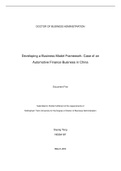Thesis
"The Impact of Digital Marketing on Business Growth" "Consumer Behaviour in the Digital Age: An Analysis of Marketing Strategies" "Leveraging Social Media for Successful Business Marketing" "Marketing Mix and Its Effectiveness in the
- Course
- Institution
"The Impact of Digital Marketing on Business Growth" "Consumer Behaviour in the Digital Age: An Analysis of Marketing Strategies" "Leveraging Social Media for Successful Business Marketing" "Marketing Mix and Its Effectiveness in the Modern Business Landscape"
[Show more]



